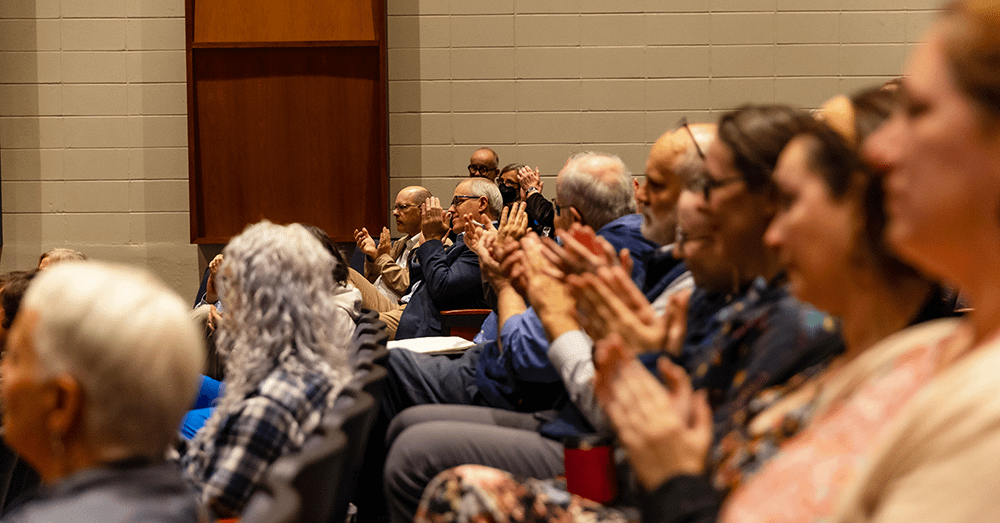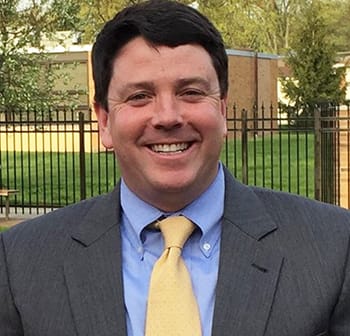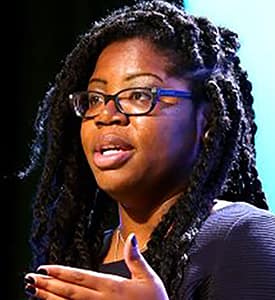Speaker engages campus on race and privilege
In introducing luncheon speaker Tim Wise, a prominent author-activist who spent Thursday challenging basic assumptions of society and higher education concerning race and privilege, Saint Michael’s student Nga Nguyen ’18 perceptibly choked up as she described the biases her Vietnamese immigrant family faced when she was a little girl.
An officer of the campus MLK Society that co-sponsored Wise’s visit (including the lunch in Dion, a morning workshop and an evening talk), Nguyen recalled before the noon talk how she resented her parents at the time when she had to study books and articles so she could learn English to translate for them, instead of being able to go out and play.
“I was young and didn’t understand social concepts and the fears they experienced,” she said, adding that now as an adult college student, she better understands the biases and visual barriers that limited her parents, whom she said had little chance to advance in their factory jobs because of those biases. “It was the same biases I heard during the election,” she said after pausing to collect herself. She suggested that educational institutions are not teaching social awareness enough, which needs to change.
That was part of Wise’s message all day too. Kimoi Seale of the Multicultural Affairs office, another co-sponsor of the speaker’s visit, had started the mid-day Dion lunch session praising what he called “great conversations” at the morning workshop, and said he hoped those conversations won’t die down across campus after the present emotional time. “We must ask who is missing from the conversation,” he said, noting how a student at the workshop said every person’s biases cause ripples in another person’s life each day.
Intentionality vs. outcomes
Wise’s main point was that, while Saint Michael’s has one of the better mission statements he has seen in expressing an institutional consciousness about equality and doing something about it, “between intentionality and outcome, something is breaking down” –as at most or even all colleges. That’s partly because “if you don’t’ understand what came before, you can’t understand current events,” he said. Across American systems, from health care and social work to K-12 education up to higher education, this is true, he said — that the systems are flawed at their roots.
He said a problem is most don’t’ realize that, historically, the purpose of higher education always has been to create greater inequality in his view, despite naïve talk one might hear on education being the “great equalizer.” He gave examples from history – Thomas Jefferson, who proposed six years of compulsory education and “raking a few geniuses from the rubbish”; or Woodrow Wilson, an overt racist who felt one group should be prepped for college and the larger group for manual tasks. Even former Education Secretary Bill Bennett under George W. Bush said once on a news show that the biggest problem in education is that “too many people are going to college.” Wise called it the “mentality of the slave-owner” in assuming that certain jobs are for those of certain education. “The machine is programmed to produce a certain product,” he said, so we “need to retool the machinery” or not be surprised to experience unjust stratification.
But today, that’s like trying to be a good cop in a corrupt police department, he said. One suggestion he had was to figure out a way to articulate through a sort of “branding” that a College is committed to equality, beyond just lip-service. “Show the mission is central to everything you do at the College,” he said, by basing admission or graduation on real evidence of commitment to the mission rather than test scores. “Make it part of getting in and out,” he said. “For hiring of faculty and staff too.”
While he admires college service outreaches like the Saint Michael’s MOVE trips, it’s important for privileged college students not to be seen as setting out to “fix people or society without figuring out why it’s broken.” Too often, he sees such service work that is not rooted in solidarity and “transformational change” as it should be, he said. Wise floated the idea of Catholic or social-justice-oriented colleges like Saint Michael’ forming a consortium with like-minded institutions to show students “there are other ideas worth looking at” beyond traditional criteria like tests scores. Moise St. Louis, director of Multicultural Affairs/associate dean of students, said from the audience that focusing on social justice in an environment that is not itself socially just, whether larger society or a college campus, is hard. “How do we maintain our mission in an environment that is antithetical to it?” he asked.
Sharing a viewpoint on elections
The recent election shows that Donald Trump defines the nation by “blood and soil,” traditional in some parts of the world through history, but not until now so much the case in the U.S., where “nation” always has been defined by an “idea set” that anybody could adhere to in theory. “That definition is now being challenged,” he said.
For Wise’s evening talk, McCarthy Recital Hall was filled with hundreds of students, many from first-year seminars, along with members of the public including spill-over into the McCarthy theater. Wise offered a hard-hitting critique of society around the notion that while, in his view, the nation had just been through a catastrophic moment in race relations with the recent presidential election, it can be a moment of clarity for society too, which isn’t all bad. He clearly read the election as a racist backlash, and while he expressed empathy for those who have lost jobs, he said we need to protect the really vulnerable who have been targeted. The American Dream of the meritocracy of individualism – “work hard and get ahead” – is falling apart, he suggested, and people of color have always known it hasn’t worked, at least for them. Wise expressed his view that Donald Trump capitalized on people who have had privilege in the system and now are hurting.





